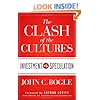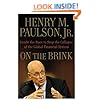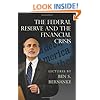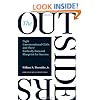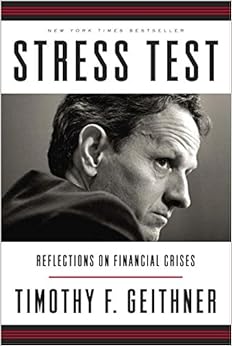
Stress Test: Reflections on Financial Crises
and over one million other books are available for Amazon Kindle. Learn more


Flip to back
Flip to front


Stress Test: Reflections on Financial Crises Hardcover – Deckle Edge, May 12, 2014
See all 8 formats and editions
Hide other formats and editions
| Amazon Price | New from | Used from |
|
Audio CD, Audiobook, Unabridged
"Please retry"
|
$19.87 | $19.00 |

$18.99
FREE Shipping on orders over $35.
In Stock.
Ships from and sold by Amazon.com.
Gift-wrap available.
NO_CONTENT_IN_FEATURE
Start reading Stress Test: Reflections on Financial Crises on your Kindle in under a minute.
Don't have a Kindle? Get your Kindle here, or download a FREE Kindle Reading App.
Don't have a Kindle? Get your Kindle here, or download a FREE Kindle Reading App.
Best Books of the Month
Want to know our Editors' picks for the best books of the month? Browse Best Books of the Month, featuring our favorite new books in more than a dozen categories.
Want to know our Editors' picks for the best books of the month? Browse Best Books of the Month, featuring our favorite new books in more than a dozen categories.
Product Details
Would you like to update product info or give feedback on images?.
|
Editorial Reviews
Review
“He’s written a really good book — we might as well get that out of the way, as so much else about Timothy F. Geithner remains unsettled… There’s hardly a moment in Geithner’s story when the reader feels he is being anything but straightforward — a near-superhuman feat for someone who spent so much time in public life defending himself from careless and dishonest personal attacks. The decisions he made are easier to criticize than they are to improve upon. I doubt many readers will put his book down and think the man did anything but his best. On his feet he might have stammered and wavered. That in itself was always a sign he was unusually brave.” –Michael Lewis, New York Times Book Review
“An intimate take on the financial crisis… gripping… conveys in visceral terms just how precarious things were during the crisis, just how frightened many first responders were, and just what an achievement it was to avert a major depression… [Geithner] demonstrates that he can discuss economics in an accessible fashion, making the situation the country faced in 2008 and 2009 tactile, comprehensible—and harrowing—to the lay reader. Along the way, he also gives us a telling portrait of himself.” –New York Times
“A how-to manual for anyone faced with a financial crisis… Mr Geithner was known for his brutal candor, and as an author, he does not disappoint.” —The Economist
“A fascinating memoir about life in the maelstrom of the financial crisis… Earlier books have described much of what happened that September, but Geithner was present for all the frantic meetings, the thousands of phone calls — and in the case of Lehman, the failure to find a buyer that could keep it alive. New problems cropped up almost weekly, if not daily. He explains each in easy-to-understand language and what the issues were that shaped the responses… There could be another crisis someday, of course, but what Geithner and his colleagues did has made one far less likely.” –USA Today
“Sharply worded and candid memoir.” —Financial Times
“Geithner does an admirable job of explaining the origins and complexities of the crisis for the average person. But there’s enough detail and retrospective lessons-learned to make it valuable for students of financial history….fast-paced and colorful….Stress Test goes beyond other crisis books.” –Los Angeles Times
“An unsparing insider’s account of the financial crisis from the former Secretary of the Treasury, unpacking the hard decisions and terrible trade-offs that devastated the economy but staved off a deep, lasting depression.” —TIME.com
“The central irony of Stress Test, the new memoir by former U.S. Treasury Secretary Tim Geithner, is that a guy who was accused of being a lousy communicator while in office has penned a book that is such a good read…I’ve now read four or five of these first drafts of the history of the Great Recession, and I believe Stress Test represents the biggest contribution of the bunch.” —Bill Gates
“Sensational . . . Tim’s book will forever be the definitive work on what causes financial panics and what must be done to stem them when they occur.” —Warren Buffett
“Very few important subjects in American history have been the subject of as much disinformation and deliberate distortion as the events surrounding the financial crisis that broke in 2008. Tim Geithner’s candid, clear-headed, and refreshingly self-effacing account of his role in formulating the federal government’s response is a very welcome antidote. Geithner’s book is a triple threat: it is first-rate economic history, insightful political science, and, most important, a cogent exposition of the importance of adhering to the policies adopted in the aftermath of the crisis if we are to succeed in diminishing the likelihood of any recurrence.” —Barney Frank
“Stress Test is an absolutely compelling account of the financial crisis, written in a clear, graceful style with striking honesty at every step along the way. Timothy Geithner brings a complex story to life with telling anecdotes and personal reflections.” —Doris Kearns Goodwin
“This is a lucid, fascinating, and extremely important book. Every American should read it. Geithner does something unusual: he engages in substance. With both insight and humility, plus a good dose of wry humor, he explains what really happened during the financial crisis. No matter your political persuasion, you will find this book educational, enlightening, and interesting.” —Walter Isaacson
“The country owes Tim Geithner great appreciation for his role in overcoming the financial crisis of 2008. He has now indebted it further with writing a thoughtful, very readable and informative account of the conduct of policy at the edge of disaster.” —Henry A. Kissinger
“An intimate take on the financial crisis… gripping… conveys in visceral terms just how precarious things were during the crisis, just how frightened many first responders were, and just what an achievement it was to avert a major depression… [Geithner] demonstrates that he can discuss economics in an accessible fashion, making the situation the country faced in 2008 and 2009 tactile, comprehensible—and harrowing—to the lay reader. Along the way, he also gives us a telling portrait of himself.” –New York Times
“A how-to manual for anyone faced with a financial crisis… Mr Geithner was known for his brutal candor, and as an author, he does not disappoint.” —The Economist
“A fascinating memoir about life in the maelstrom of the financial crisis… Earlier books have described much of what happened that September, but Geithner was present for all the frantic meetings, the thousands of phone calls — and in the case of Lehman, the failure to find a buyer that could keep it alive. New problems cropped up almost weekly, if not daily. He explains each in easy-to-understand language and what the issues were that shaped the responses… There could be another crisis someday, of course, but what Geithner and his colleagues did has made one far less likely.” –USA Today
“Sharply worded and candid memoir.” —Financial Times
“Geithner does an admirable job of explaining the origins and complexities of the crisis for the average person. But there’s enough detail and retrospective lessons-learned to make it valuable for students of financial history….fast-paced and colorful….Stress Test goes beyond other crisis books.” –Los Angeles Times
“An unsparing insider’s account of the financial crisis from the former Secretary of the Treasury, unpacking the hard decisions and terrible trade-offs that devastated the economy but staved off a deep, lasting depression.” —TIME.com
“The central irony of Stress Test, the new memoir by former U.S. Treasury Secretary Tim Geithner, is that a guy who was accused of being a lousy communicator while in office has penned a book that is such a good read…I’ve now read four or five of these first drafts of the history of the Great Recession, and I believe Stress Test represents the biggest contribution of the bunch.” —Bill Gates
“Sensational . . . Tim’s book will forever be the definitive work on what causes financial panics and what must be done to stem them when they occur.” —Warren Buffett
“Very few important subjects in American history have been the subject of as much disinformation and deliberate distortion as the events surrounding the financial crisis that broke in 2008. Tim Geithner’s candid, clear-headed, and refreshingly self-effacing account of his role in formulating the federal government’s response is a very welcome antidote. Geithner’s book is a triple threat: it is first-rate economic history, insightful political science, and, most important, a cogent exposition of the importance of adhering to the policies adopted in the aftermath of the crisis if we are to succeed in diminishing the likelihood of any recurrence.” —Barney Frank
“Stress Test is an absolutely compelling account of the financial crisis, written in a clear, graceful style with striking honesty at every step along the way. Timothy Geithner brings a complex story to life with telling anecdotes and personal reflections.” —Doris Kearns Goodwin
“This is a lucid, fascinating, and extremely important book. Every American should read it. Geithner does something unusual: he engages in substance. With both insight and humility, plus a good dose of wry humor, he explains what really happened during the financial crisis. No matter your political persuasion, you will find this book educational, enlightening, and interesting.” —Walter Isaacson
“The country owes Tim Geithner great appreciation for his role in overcoming the financial crisis of 2008. He has now indebted it further with writing a thoughtful, very readable and informative account of the conduct of policy at the edge of disaster.” —Henry A. Kissinger
About the Author
TIMOTHY F. GEITHNER was the seventy-fifth secretary of the U.S. Department of the Treasury and previously served as president and chief executive officer of the Federal Reserve Bank of New York. He wrote this book as a distinguished fellow at the Council on Foreign Relations.
More About the Author
Discover books, learn about writers, read author blogs, and more.
Customer Reviews
Most Helpful Customer Reviews
200 of 246 people found the following review helpful
By
Brian L Peters
on May 14, 2014
Format: Hardcover
Verified Purchase
19 Comments
Sending feedback...
I worked with Geithner at the NY Fed. I was a bit player present at many of the meetings and calls described.
I imagine most ratings will reflect their predisposition to the actions taken by the Fed and Treasury during the crisis. I did not come here to debate those.
I merely came to state that the book is an honest account of how Tim and the rest of us thought during the events described. This is what he believed, and what we believed. I cannot comment on the accounts from Treasury, though they correspond with what I annecdotally heard at the time.
I imagine most ratings will reflect their predisposition to the actions taken by the Fed and Treasury during the crisis. I did not come here to debate those.
I merely came to state that the book is an honest account of how Tim and the rest of us thought during the events described. This is what he believed, and what we believed. I cannot comment on the accounts from Treasury, though they correspond with what I annecdotally heard at the time.
Thank you for your feedback.
If this review is inappropriate, please let us know.
Sorry, we failed to record your vote. Please try again
52 of 68 people found the following review helpful
By
Generic Guy
on May 19, 2014
Format: Hardcover
Verified Purchase
5 Comments
Sending feedback...
The Debt-Deflation Theory of Great Depressions (What would have happened - and did - Depression 1.0 )
And, Geithner still seems shell shocked. He does a much better job framing the crisis in the book than in real time. But he still doesn't do an a sufficient job of conveying the crushing impact of market panic. It was the kind of fear that you can smell.
His major error is not emphasizing just how small the differences are between market based traditional bankruptcy, bailouts, and nationalization. With nationalization, the owners/shareholders are wiped out as well as some of the bondholders. In traditional bankruptcy, the owners/shareholders are wiped out and bondholders are usually wiped out or take a serious haircut. With partial nationalization (bailouts) including TARP and other guarantee programs, shareholders were either totally wiped out or lost 90% of their investment in the weakest banks. The shareholders of the stronger banks suffered dilution of their ownership through TARP fees, mandatory warrants, and Treasury imposed capital raises.
1/4 to 1/3 of the largest financial firms were effectively nationalized. The owners/shareholders were wiped out. The ONLY difference was the treatment of bond holders, who did better under the TARP and other backstop programs. And these bondholders weren't hedge funds or investment bankers. Hedge funds wouldn't touch low yield bank debt. It was owned by Pension Funds, bond mutual funds, ordinary people and institutions that look more like the president of your local branch bank then anyone on Wall Street.
Partial nationalization. If you don't believe it, ask Ralph Nader.Read more ›
And, Geithner still seems shell shocked. He does a much better job framing the crisis in the book than in real time. But he still doesn't do an a sufficient job of conveying the crushing impact of market panic. It was the kind of fear that you can smell.
His major error is not emphasizing just how small the differences are between market based traditional bankruptcy, bailouts, and nationalization. With nationalization, the owners/shareholders are wiped out as well as some of the bondholders. In traditional bankruptcy, the owners/shareholders are wiped out and bondholders are usually wiped out or take a serious haircut. With partial nationalization (bailouts) including TARP and other guarantee programs, shareholders were either totally wiped out or lost 90% of their investment in the weakest banks. The shareholders of the stronger banks suffered dilution of their ownership through TARP fees, mandatory warrants, and Treasury imposed capital raises.
1/4 to 1/3 of the largest financial firms were effectively nationalized. The owners/shareholders were wiped out. The ONLY difference was the treatment of bond holders, who did better under the TARP and other backstop programs. And these bondholders weren't hedge funds or investment bankers. Hedge funds wouldn't touch low yield bank debt. It was owned by Pension Funds, bond mutual funds, ordinary people and institutions that look more like the president of your local branch bank then anyone on Wall Street.
Partial nationalization. If you don't believe it, ask Ralph Nader.Read more ›
Thank you for your feedback.
If this review is inappropriate, please let us know.
Sorry, we failed to record your vote. Please try again
68 of 97 people found the following review helpful
By
Reuters Breakingviews
on May 12, 2014
Format: Hardcover
5 Comments
Sending feedback...
By Breakingviews columnists
To judge the merits of Tim Geithner’s crises reflections in “Stress Test,” six Breakingviews columnists digested different pieces of the book in a short amount of time. Like the regulators who often lacked broader context, the assessments vary. Yet there’s also consensus it’s a useful tome for the financial library.
CHAPTERS 1-2
Whatever critics say, Tim Geithner can’t be accused of having a narrow outlook or partisan blinkers. He grew up in Africa, India and Thailand as well as back home in the United States. He enrolled at preppy Dartmouth and signed up to learn Chinese. His mother is a “bleeding-heart liberal,” his father a lifelong Republican, and Geithner himself now a registered independent. He describes his background as privileged, but not rich.
He accepts in self-deprecating fashion that he gained a reputation as a fan of financial bailouts, despite the “moral hazard” precedent they created. But Geithner’s interest in finance and economics came late, after a more geopolitical focus at graduate school and Henry Kissinger’s consulting firm. It was fired up partly by Larry Summers, whom Geithner met in 1992, four years into his first stint at the Treasury Department, working on trade. Summers, later treasury secretary, “had earned a reputation for brilliance, if not for concealing it.”
Exposure to the faltering Japanese economy, a crisis in Mexico and another in Asian financial markets also helped shape Geithner’s worldview. Even as the U.S. economy went from strength to strength in the later 1990s his main recollection, he says, is “how scary it was, how little we knew.” And that was before he went to work at crisis central, the International Monetary Fund.Read more ›
To judge the merits of Tim Geithner’s crises reflections in “Stress Test,” six Breakingviews columnists digested different pieces of the book in a short amount of time. Like the regulators who often lacked broader context, the assessments vary. Yet there’s also consensus it’s a useful tome for the financial library.
CHAPTERS 1-2
Whatever critics say, Tim Geithner can’t be accused of having a narrow outlook or partisan blinkers. He grew up in Africa, India and Thailand as well as back home in the United States. He enrolled at preppy Dartmouth and signed up to learn Chinese. His mother is a “bleeding-heart liberal,” his father a lifelong Republican, and Geithner himself now a registered independent. He describes his background as privileged, but not rich.
He accepts in self-deprecating fashion that he gained a reputation as a fan of financial bailouts, despite the “moral hazard” precedent they created. But Geithner’s interest in finance and economics came late, after a more geopolitical focus at graduate school and Henry Kissinger’s consulting firm. It was fired up partly by Larry Summers, whom Geithner met in 1992, four years into his first stint at the Treasury Department, working on trade. Summers, later treasury secretary, “had earned a reputation for brilliance, if not for concealing it.”
Exposure to the faltering Japanese economy, a crisis in Mexico and another in Asian financial markets also helped shape Geithner’s worldview. Even as the U.S. economy went from strength to strength in the later 1990s his main recollection, he says, is “how scary it was, how little we knew.” And that was before he went to work at crisis central, the International Monetary Fund.Read more ›
Thank you for your feedback.
If this review is inappropriate, please let us know.
Sorry, we failed to record your vote. Please try again
78 of 113 people found the following review helpful
By
JPM
on May 12, 2014
Format: Audible Audio Edition
29 Comments
Sending feedback...
Geithner's persuasive case for Federal Bailouts, 2 big admissions and a good deal of memorable stories of his interactions with who's who to save our Blue planet from sinking in a depression
Timothy F. Geithner, the US Treasury Secretary (2009-2013), former President of the Federal Reserve Bank of New York and currently the President of Warburg Pincus, a global Private Equity investment institution), emphasises on the importance of Troubled Asset Relief Program (TARP or Federal Bailouts) of 2008 and his role in saving the world from the depths of Economic Depression.
In his first book titled "Stress Test," Geithner constructs a persuasive case of his role as the man most responsible for the TARP (Federal Bailouts) of 2008. Financial bailouts historically were only made available to the commercial banks and not extended to the Wall Street Investment houses, Geithner was the first Treasury Secretary to have made this possible.
He makes the case for TARP in saving the Financial Institutions. He extends the argument on the value of Financial Institutions gaining enormity when the country in question is the United States of America (USA), the largest economy on the planet. The importance of the Financial Institutions grows and reaches epic global proportions, when the same nation is facing a crisis, which finds its origins in the core of the same Financial Institutions. The TARP, which then amounted to approximately 700 Billion dollars (and have now reached ~ 8 trillion dollars: all funded by taxpayer money) was released to act as a safety net for the Financial Institutions who in turn are to protect the Tax Payer of the vicious cycle of recession, which if left uncontrolled would have led to Global Economic Depression).Read more ›
Timothy F. Geithner, the US Treasury Secretary (2009-2013), former President of the Federal Reserve Bank of New York and currently the President of Warburg Pincus, a global Private Equity investment institution), emphasises on the importance of Troubled Asset Relief Program (TARP or Federal Bailouts) of 2008 and his role in saving the world from the depths of Economic Depression.
In his first book titled "Stress Test," Geithner constructs a persuasive case of his role as the man most responsible for the TARP (Federal Bailouts) of 2008. Financial bailouts historically were only made available to the commercial banks and not extended to the Wall Street Investment houses, Geithner was the first Treasury Secretary to have made this possible.
He makes the case for TARP in saving the Financial Institutions. He extends the argument on the value of Financial Institutions gaining enormity when the country in question is the United States of America (USA), the largest economy on the planet. The importance of the Financial Institutions grows and reaches epic global proportions, when the same nation is facing a crisis, which finds its origins in the core of the same Financial Institutions. The TARP, which then amounted to approximately 700 Billion dollars (and have now reached ~ 8 trillion dollars: all funded by taxpayer money) was released to act as a safety net for the Financial Institutions who in turn are to protect the Tax Payer of the vicious cycle of recession, which if left uncontrolled would have led to Global Economic Depression).Read more ›
Thank you for your feedback.
If this review is inappropriate, please let us know.
Sorry, we failed to record your vote. Please try again

